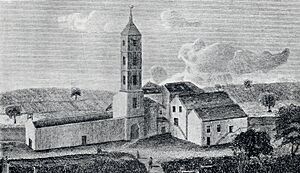Neil McVicar (minister) facts for kids
Neil McVicar (born 1672, died 1747) was an important minister in the Church of Scotland. He could speak both Gaelic and English very well. McVicar started his work in Fort William. Later, in 1707, he moved to Edinburgh's West Kirk. He strongly supported the Hanoverian kings of Britain. He was against the Jacobite rebellions that tried to put a different family on the throne. McVicar also helped the many Gaelic-speaking people living in Edinburgh. He stayed at the West Kirk until he died in 1747.
Contents
Neil McVicar's Life and Work
Neil McVicar was born in 1672. His family name, McVicar, means "son of the vicar." A vicar is a type of church leader.
Early Ministry in Fort William
In the late 1600s, McVicar worked as a chaplain in Fort William. A chaplain is a minister who serves a specific group, like soldiers. He served the English-speaking soldiers in the fort. He also helped the local people who spoke Gaelic. McVicar was fluent in both languages.
Moving to Edinburgh

In May 1707, McVicar became a minister at Edinburgh's West Kirk. This was a very old and important church in Scotland. He took over from Thomas Paterson. McVicar stayed at the West Kirk for over 40 years. During this time, other ministers came and went. One famous minister was George Wishart.
McVicar was the only minister in Edinburgh who spoke Gaelic. Because of this, he held special services in Gaelic. These services were for people from the Highlands who had moved to the city. Many of them could not speak English.
Political Views and Royal Connections
McVicar was strongly against the Jacobites. The Jacobites wanted to bring back the Stuart royal family to the throne. He also refused to take the Oath of Abjuration in 1712. This oath would have made him promise loyalty to the Hanoverian king.
In 1729, McVicar received a special title. He became the formal Almoner to King George II in Scotland. An almoner is someone who gives out charity on behalf of the king. Even though he was a "traditionalist," McVicar disagreed with the Law of Patronage. Most Scottish ministers at the time also opposed this law.
The Jacobite Rising of 1745
During the Jacobite Rising of 1745, Jacobite forces took over Edinburgh. They stopped church services in many city churches. However, services continued as usual at St Cuthbert's. McVicar cleverly avoided praying for Charles Edward Stuart, the Jacobite leader. Instead, he offered a famous prayer: "Bless the King. Thou knowest what King I mean. As for the man that is come among us seeking an earthly crown, we beseech Thee in mercy to take him to Thyself, and give him a crown of glory." This prayer showed his loyalty to the king without directly naming him.
In 1746, Sir James Campbell offered McVicar a new job in Knapdale. But McVicar chose to stay at the West Kirk.
He passed away in Edinburgh on January 29, 1747, at the age of 74. He is buried in the churchyard of St Cuthbert's.
Neil McVicar's Family
Neil McVicar was married twice. His first marriage was in July 1705 to Lillias Dunbar. She was born in 1686 and passed away in 1732. They had thirteen children together, including:
- Hugh McVicar, who became a minister.
- Alexander McVicar, a merchant in Edinburgh.
- Neil McVicar, also a merchant in Edinburgh.
- Jean McVicar, who married a minister named Rev David Black.
- Patrick McVicar, who worked as a Writer to the Signet (a type of lawyer).
In 1737, McVicar married for a second time. His second wife was Bridget Balfour. She was the sister of James Balfour of Pilrig. Bridget passed away in 1764.
 | Isaac Myers |
 | D. Hamilton Jackson |
 | A. Philip Randolph |

